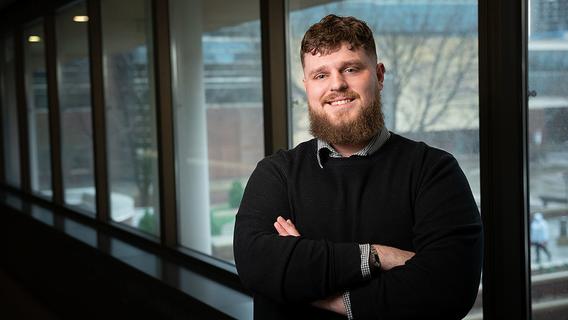
By Ann Nordby
When he was young, Harrison Maxwell didn't see himself as college material. He grew up in a low-income family that moved frequently around the western United States during his childhood. But Maxwell had a natural curiosity and an interest in the welfare of others.
He became interested in learning about people from modest means like him who had gone on to make significant contributions to society. Trolling Wikipedia for such stories, he discovered someone who became a hero to him.
It was Hubert Humphrey, who grew up poor in rural South Dakota and became a champion of the disadvantaged while serving as mayor of Minneapolis, a U.S. senator from Minnesota, and vice president.
Maxwell served in the U.S. Marine Corps, then enrolled in the University of Washington, becoming the first in his family to go to college. He earned a degree in sociology, and became interested in urban planning, a field in which he would be able to improve people's lives on a large scale.
"Urban planning is applied sociology," he said. "I could see urban planning that was not working for people—the roads with no crosswalks, bad sidewalks, no parks. I've had friends who actually died because of bad urban planning. Good urban planning can benefit communities."
The Humphrey School 'was it'
"I found out that the public policy school at the University of Minnesota was called the Humphrey School, and that was it," Maxwell said.
The Humphrey School’s Master of Urban and Regional Planning (MURP) has several defined concentrations, and also allows students to design their own. Maxwell has combined Humphrey School courses with others from across the University for a self-defined concentration in community economic development. He is minoring in landscape architecture from the University's College of Design to learn placemaking skills, site analysis, and planning review—all valuable skills for a planner.
Maxwell said the 33 students in his MURP cohort bring different perspectives, and support each other in many ways. "We have a bunch of Discord channels. We constantly talk about internships, classes, how is your mental health today," he said.
Similarly, professors foster class discussions that teach students how to engage with respect. The experience is boosting his confidence as a policy professional.
Maxwell and three of his classmates have co-produced a podcast called "Veiled Truth," which examines issues in civic engagement. The group chose the podcast medium to make the discussion more accessible to more people than a journal article would be.
Two Humphrey School internships have already kick-started Maxwell's career. In the first, he served as a community development intern with the small city of Lino Lakes, Minnesota, north of the Twin Cities metro area. In that role, he learned the ropes of city planning and how to engage with the public.
His second opportunity was as a community development intern with the city of St. Louis Park, an inner-ring suburb just west of Minneapolis. Maxwell describes the city as very progressive: last year it elected the first Somali American mayor in the country, and its residents are highly civically engaged.
He did small-area planning around light rail transit stations, gathering input from low-income people in the area to see what would be most useful for them. He found it rewarding and hopes to continue doing similar work after graduation in May.
Emulating Hubert Humphrey
Maxwell has settled in the central Minnesota town of Becker, together with his life partner. He loves living there, where neighbors look after neighbors. Eventually, he would like to be a planner in St. Cloud, which is rapidly growing from a small, majority-white city to a more diverse city, with newcomers from around the world.
Maxwell said such a role would be an exciting chance to apply his skills from his Humphrey School coursework and internships, and to contribute to the community where he wants to stay and put down roots.
"I want to be a part of the transition with changing demographics. There are layers of trauma that need to be addressed,” he said. ”The Humphrey School is giving me the knowledge to address that in a holistic way, with well-rounded planning."
While he doesn't compare himself to Hubert Humphrey, his childhood hero, Maxwell said he wants to follow in his footsteps.
"I love making people's lives better, and I want to take away the hurt for them. That's what Humphrey did."

